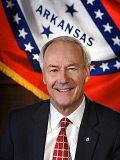State Governors 1975-Present
State Governors 1975-Present
David Hampton Pryor
 Born: August 29, 1934, at Camden, Arkansas
Born: August 29, 1934, at Camden, Arkansas
Died: April 20, 2024, at Little Rock, Arkansas
Buried: Mount Holly Cemetery, Little Rock
Served: 1975-1979
David Pryor received a B.A. in political science from the University of Arkansas in 1957 and a LL.B. from the University of Arkansas School of Law in 1964. A newspaperman from 1957 until 1961, Pryor's political career began in the Arkansas House of Representatives where he served three terms, 1961 to 1966. He was then elected to the U.S. House of Representatives, where he served from 1967 to 1972. He was elected Governor in 1974 and served two terms. During his tenure, Pryor championed reform of the 1874 Constitution and was instrumental in the calling of two conventions to revise the state's fundamental document. Pryor's administrations were noted for the quality of his appointments to boards and commissions, including numerous women and African-Americans, and by his devotion to fiscal restraint. His legislative programs included creation of the Local Services and Natural and Cultural Heritage Departments, education aid for the elderly and the ultimately defeated "Arkansas Plan" which would have shifted much taxation responsibility from state to local government. In 1978 Pryor successfully sought a seat in the U.S. Senate, where he served until 1996. Most recently, Pryor has served a two-year term as the Director of the Institute of Politics at the Kennedy School of Government at Harvard University and in late 2003 was tapped as the first dean of the University of Arkansas's Clinton School of Public Service.
William Jefferson Clinton
 Born: August 19, 1946, at Hope, Arkansas
Born: August 19, 1946, at Hope, Arkansas
Died: n/a
Buried: n/a
Served: 1979-1981; 1983-1992
William J. Clinton was born in Hope, Arkansas and earned a bachelor's degree in international affairs in 1968 from Georgetown University School of Foreign Service and attended Oxford University as a Rhodes Scholar. After graduating from Yale Law School in 1973, he joined the faculty of the University of Arkansas School of Law and practiced in Fayetteville. He was elected attorney general in 1976 and in 1978 won his first bid for governor, becoming the state's second-youngest governor. Clinton's first administration advanced small business development, improved teacher standards and road construction but suffered from the effects of regional and nation economic woes, natural disasters and bad publicity stemming from an influx of Cuban refugees and increased vehicle-licensing fees. In 1980 Clinton's re-election bid failed but in 1982 he regained the governor's office, to which he was re-elected in 1984, 1986, and 1990. Notable initiatives of Clinton's second tenure include education reform, multilevel economic development and adoption of state code of ethics. He served as chair of the Democratic Leadership Council, the Democratic Governors' Association, and the Education Commission of the States. In 1986 he served as chair of the Southern Growth Policies Board and of the National Governors Association from 1986 to 1987. In October 1991, Governor Clinton resigned his office in order to pursue, successfully, the Democratic party's nomination for president.
Frank Durward White
 Born: June 4, 1933, at Texarkana, Texas
Born: June 4, 1933, at Texarkana, Texas
Died: May 21, 2003, at Little Rock, Arkansas
Buried: Mount Holly Cemetery, Little Rock
Served: 1981-1983
Frank D. White was born Durward Frank Kyle on June 3, 1933. His mother remarried and his stepfather, Frank White, adopted him. He graduated from the New Mexico Military Institute and received an appointment to the United States Naval Academy in 1952. After graduation from Annapolis in 1956, White took a commission in the U.S. Air Force, accumulating more than 1,800 flying hours as a captain. He entered business in Little Rock in 1961 with the Merrill Lynch, Pierce, Fenner and Smith securities brokerage; White later was affiliated with Little Rock banking concerns. He was appointed director of the Arkansas Industrial Development Commission in 1975, a position he held until 1977. Elected governor in 1980, White's friendly personality and self-deprecating style won him much personal popularity but his legislative program was modest and won little support in the Legislature or around Arkansas. During his tenure, he signed a measure approved by the legislature requiring Arkansas teachers to include "creation science" in the curriculum if the theory of evolution was also taught. The law was later struck down as unconstitutional by a federal judge but drew national attention. White's efforts to reform utility regulation were overshadowed by charges of coziness with utility company executives. Frank White lost his 1982 bid for re-election, and returned to commercial banking. Arkansas Governor Mike Huckabee named White his state banking commissioner in July 1998. Frank White passed away on May 21, 2003 and was laid to rest after lying in state in the Capitol Rotunda.
James Guy Tucker Jr.
 Born: June 13, 1943, at Oklahoma City, Oklahoma
Born: June 13, 1943, at Oklahoma City, Oklahoma
Died: n/a
Buried: n/a
Served: 1991-1996
James Guy Tucker Jr. was born in Oklahoma City and was raised in Arkansas. He received a bachelor's degree in government from Harvard University in 1964 and a law degree from the University of Arkansas in 1968. He was a member of the U.S. Marine Corps Reserve and was a civilian correspondent in South Vietnam in 1965 and 1967. He served as a prosecuting attorney; state attorney general; and a member of the U.S. House of Representatives, where he served on the Ways and Means Committee. He was elected lieutenant governor in 1990; he resigned from his position as a senior partner in his law firm to become acting governor in October 1991, when then-Governor Bill Clinton began his campaign for President. He served the balance of the Clinton term and then was elected to a four-year term in November 1994. As governor, Tucker pursued a course of economy, cutting agency budgets and funneling saved monies into education, but called a special session of the Legislature in August 1994 to deal with the rising juvenile crime rate. Over thirty measures from this session were signed into law, affecting most aspects of the juvenile justice system. In 1995, however, Tucker's political fortunes began to fail. An initiative on his part to improve roads was defeated. This was followed by his indictment as part of the expanding Whitewater investigation surrounding President Clinton. Tucker's July 1996 conviction was followed by his resignation. Though he paid a large fine, Tucker would spend little actual time in prison because of fragile health. He maintains a residence in Little Rock and is engaged in various business ventures.
Mike Huckabee
 Born: August 24, 1955, at Hope, Arkansas
Born: August 24, 1955, at Hope, Arkansas
Died: n/a
Buried: n/a
Served: 1996-2007
A graduate of Ouachita Baptist University and an ordained Baptist minister, Mike Huckabee served as president of the Arkansas Baptist State Convention and challenged veteran U.S. Senator Dale Bumpers as a Republican in the election of 1992. Although Bumpers won re-election, Huckabee polled about 40 percent of the vote. A special election was called in 1993 to choose a lieutenant governor; Huckabee defeated the Democratic nominee and earned the largest vote percentage of any Republican candidate in Arkansas's history when he successfully sought a full term in the 1996 general elections As lieutenant governor he served as acting governor on several occasions. He became Governor of Arkansas in July 1996 when his predecessor resigned. Huckabee was elected to a full four-year term as governor in 1998 and was reelected in November 2002. As governor, he advocated the reorganization of state government and various education reforms in Arkansas that significantly expanded the availability of college scholarships, increased the number of charter schools, and established new approaches to workforce education. Huckabee also advocated improved health care for children, physical fitness for all as a public-health issue, a sales-tax increase to fund state park improvements and bond issues to rebuild and improve the state's interstate highways. In the latter years of his administration, Huckabee unsuccessfully advocated school district consolidation in order to bring the state into compliance with a court-ordered overhaul of school funding and in August 2005 coordinated the state's responses to the devastation of Hurricane Katrina.
Mike Beebe
 Born: December 28, 1946, at Amagon, Arkansas
Born: December 28, 1946, at Amagon, Arkansas
Died: n/a
Buried: n/a
Served: 2007-2015
Raised by his working mother, Mike Beebe graduated fromNewport High School and earned degrees in political science from Arkansas StateUniversity and in law at the University of Arkansas. Upon admission tothe bar, Beebe began his practice in Searcy and in 1982 was named the state’s outstanding trial lawyer. That same year , Beebe ran for the stateSenate. After his incumbent opponent unexpectedly dropped out of therace, Beebe won easily; he would not face another election opponent in his twenty-year Senate career. Known for pragmatism and his ability to broker compromises, Beebe was elected president pro tempore of the body.
In 2002, Beebe was elected attorney general, again without opposition. He entered the 2006 race for governor and for the first time,faced opposition in the general election. He went on to win with morethan 55 percent of the vote over former republican U.S. Congressman AsaHutchinson as well as a Green Party and independent candidates. Arkansas’s balanced budget laws Beebe’s economic policies helped the state avoid the budget shortfalls that other states experienced during a national recession. Legislators approved his tax relief proposals that included reducing grocery and property taxes. In 2010, a year that saw dramatic victories for Arkansas Republicans in both state and congressional races, Beebe was re-elected with more than 64 percent of the vote. In his second term, Governor Beebe worked to improved education as a component in economic development. He left the governor’s office in 2015 as term limits prevented him from running for re-election.
Asa Hutchinson
 Born: December 3, 1950, at Bentonville, Arkansas.
Born: December 3, 1950, at Bentonville, Arkansas.
Died: n/a
Buried: n/a
Served: 2015-2023
Asa Hutchinson was sworn in as the 46th Governor of Arkansas on January 13, 2015. During his first full day on the job, Governor Hutchinson called the executives of six companies to let them know Arkansas wanted their business. Since then, he’s regularly reached out to top executives and traveled the world to tell Arkansas’s story, marketing the Natural State as a unique place where you can build a business while enjoying a remarkable quality of life.
Before being elected governor, Asa Hutchinson served in a variety of posts in the private and public sector. He served as Director of the Drug Enforcement Administration and as the first Undersecretary of the Department of Homeland Security. Voters in Arkansas's Third District also elected him to Congress three times.
A graduate of the University of Arkansas law school, Asa Hutchinson, at age 31, was appointed by President Reagan as the nation's youngest U.S. attorney.
He and his wife Susan have been married 42 years. They have four children and five grandchildren.
Sarah Huckabee Sanders

Born: August 13, 1982, at Little Rock, Arkansas.
Died: n/a
Buried: n/a
Served: 2023-present
Sarah Huckabee Sanders is the 47th Governor of Arkansas. Inaugurated on January 10, 2023, she is the first woman to serve as governor of the state and is currently the youngest governor in
the country.
Prior to her historic victory, Sarah served as White House Press Secretary for President Donald Trump from 2017 to 2019. A trusted confidant of the President, she advised him on everything from press and communications strategy to personnel and policy. Sarah was only the third woman – and the very first mom – to ever hold the job of White House Press Secretary.
Sarah grew up in Pine Bluff and Texarkana and is a proud graduate of Little Rock Central High and Ouachita Baptist University.
She lives in Little Rock with her husband, Bryan, their children Scarlett, Huck, and George, and their golden retriever, Traveler.




